The dazzling spring weather is making everything greener around Charleston. The peacefulness of this oak tree in Magnolia Cemetery snapped Sunday by contributing photographer Michael Kaynard is a calming reminder for the day of rest. More: KaynardPhotography.com
IN THIS EDITION | APRIL 13, 2015 | Number 7.24
FOCUS: CofC student painters look to summer
BRACK: What was done right and what still needs work
IN THE SPOTLIGHT: Charleston Green Commercial
GOOD NEWS: Book project, hospital get big grants
FEEDBACK: Send your letters
CALENDAR: April 13+ — Earth Day, Spring Jam, paddling
REVIEW: Under the Dome
MYSTERY PHOTO: Close-up
S.C. ENCYCLOPEDIA: Christopher Gadsden
TODAY’S FOCUS
CofC student painters look to summer
By Jordan Caroway and Zach Barrack
APRIL 13, 2015 | Young Entrepreneurs Across America, also known as YEAA, has been giving college students the chance to run their own Student Painters businesses since 1987.
Student Painters gives college students the tools and training to successfully run a painting business during the spring and summer. Stude
nts get this position through a series of interviews with the hopes of becoming a branch manager, each of whom are responsible for the marketing, sales, hiring and production of their own business. Branch managers who excel in leadership and time management are brought back the following year to become regional managers.
The company offers a variety of services, focusing mainly on exterior painting, pressure washing and deck staining.
Although this experience looks good on a resume and can be financially rewarding, those are not the only two reasons that we decided to embark on this once in a lifetime journey.
Student Painters allows the students and the community to have a mutually beneficial relationship. The community not only gets to invest in quality work on their homes, but also get the chance to invest in the future business leaders of Charleston, while the students gain credibility, real-world experience, tuition and the knowledge that they have what it takes to achieve success.
Before production season, all painters attend an extensive weekend of paint training provided by Sherwin Williams. Not only are all the painters professionally trained, but the crews are managed by students who are motivated gain complete satisfaction from all homeowners they work with.
We are also excited at the opportunity to pay our way through college. Taking out loans for college can be very stressful but so can having your parents pay out of pocket. Through this internship, we’re are able to pay for our education — and for all students, that makes the entire thing worth it.
We’re following in the footsteps of our two executives, Patrick Gardner and Ken Hansell. There’s no better coach to learn from than someone who has been in your shoes only a year prior. These two executives are helping six students in the Tri-county area, as well as two students in the Statesboro, Ga., area to run their businesses this year. Pat and Ken have dedicated a lot of time to their internship taking turns on the weekends driving to Georgia and back, and it has a positive effect on the whole team’s commitment and motivation. These are not your average college students, but students who are interested in going above and beyond their peers.
Among the incentives of paying tuition and gaining valuable real world experience, there’s an additional incentive if we can each run a minimum of a $70,000 business — a trip to Jamaica.
Student Painters is a one-of-a-kind internship that requires a lot out. However, the rewards are incredible. Gaining real world experience, along with the chance to go to Jamaica, makes Student Painters a highly sought-after internship program, allowing it to be very selective in their hiring process.
If you have exterior painting, pressure-washing or deck-staining needs and would like to invest in the future of Charleston business leaders, don’t hesitate to set up a free, no-obligation estimate.
- Zach Barrack will be running his business in Mount Pleasant and can be reached at 843-901-3356 or by email at zbarrack@gmail.com.
- Jordan Caroway will be running his business in West Ashley and the downtown area. He can be reached at 803-577-2171 or by email at carowayjb@g.cofc.edu.
COMMENTARY
What was done right and what needs work still
By Andy Brack, editor and publisher
North Charleston, the state’s third largest city, has never been an easy place in which to live. With large pockets of poverty and schools that face inner-city conflicts not found in suburbs, daily life — even today — can be a struggle.
![]() Back in the late 1980s as a police reporter, I headed to North Charleston often to find out what was happening. The police culture was insular, tough and tight-lipped. There was a particular way of doing things in North Charleston and often, it seemed, it involved knocking heads.
Back in the late 1980s as a police reporter, I headed to North Charleston often to find out what was happening. The police culture was insular, tough and tight-lipped. There was a particular way of doing things in North Charleston and often, it seemed, it involved knocking heads.
In 2006 and 2007, a total of 54 people were murdered or killed in North Charleston, which led to the city being named one of the nation’s most dangerous.
The city, which has roots as a working man’s offshoot of tonier Charleston, responded by cracking down even more on crime. Within years, violent crime and murder dropped to half of what it had been. And while many say the city was safer and more open because of police outreach throughout the community, a lingering question is whether vigorous traffic stops of a lot of black residents for broken tail lights or expired registration ran roughshod over civil liberties.
Maintaining safety while protecting liberties is delicate. The balance is rightfully getting more airtime these days in North Charleston and across the country after the shooting of Walter Scott last week made global headlines. An officer, who first maintained he feared for his life in a struggle with Scott, found himself in jail Tuesday on a murder charge after a video surfaced showing him shooting eight times at Scott, who was apparently fleeing after being zapped with a taser. Scott’s death was ruled a homicide by the county coroner, who said an autopsy revealed he “sustained multiple gunshot wounds to the back of his body.”
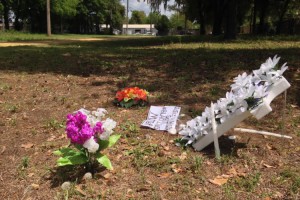
#BlackLivesMatter: A few memorials lay Wednesday in the field near where Walter Scott was murdered in North Charleston, S.C. Photo by Andy Brack.
The video could have created a powder keg that turned North Charleston into a place like Ferguson, Mo., Cleveland or New York City where high-profile deaths of blacks by white officers led to protests or violence. But fortunately, that hasn’t happened so far in North Charleston — probably for two good reasons.
First, Scott’s family called for calm and change. They displayed an unfathomable amount of grace in what is an unimaginable circumstance.
Second, North Charleston officials acted decisively and quickly. Even before the video bounced across the world on traditional and social media, authorities charged the officer involved in the shooting with murder and put him in jail. The law, Mayor Keith Summey essentially said, is the law — for police officers and everyday citizens. And if you make a bad decision, you have to live with it, he said. The day after the murder arrest, Summey announced patrol officers on the city’s force would be outfitted with body cameras, which advocates say may help defuse situations involving confrontations.
But while the city is to be commended for handling things well so far, there’s a long way to go still. Body cams may help, but technology will not solve the root at what’s eating at police departments across the state, which has had other highly-publicized officer-involved shootings in recent months.
“Requiring officers to wear body cameras to record stops can – can – help document what goes on, but they aren’t a panacea,” notes the ACLU’s Victoria Middleton. “It’s possible that they could de-escalate interactions with citizens, but cameras alone won’t solve problems of institutional bias, conscious or unconscious.”
Communities and police across the state need to build more bridges. City council members and state legislators have to determine whether more resources are needed to pay police better and get better-quality recruits. Officials should work on ways to thwart racial profiling. They need to involve citizens to determine whether police need more and better training. Citizens need more confidence in police, who can earn it by taking complaints seriously.
And more than anything, South Carolinians need to confront decades of silence, ill will and tension involving race and prejudice. If Walter Scott’s tragic death teaches us anything, it should teach us to work together so any man stopped for a broken tail light doesn’t die from being shot in the back.
NOTE: This commentary first was published April 9 in our sister legislative journal, Statehouse Report.
Andy Brack is editor and publisher of Charleston Currents. Send feedback to: editor@charlestoncurrents.com.
IN THE SPOTLIGHT
Charleston Green Commercial
 Charleston Green Commercial is a full-service commercial property management company that pays attention to detail, provides exceptional personal service and is committed to adding value to buildings. Offering professional property management, consulting and other services, the company strives to improve clients’ bottom lines with superior service, accessibility, reliability and a wealth of knowledge of the Charleston real estate market. By blending use of proven contractors and contacts with environmentally-conscious practices, the company helps clients stay on the leading edge of commercial real estate practices. More.
Charleston Green Commercial is a full-service commercial property management company that pays attention to detail, provides exceptional personal service and is committed to adding value to buildings. Offering professional property management, consulting and other services, the company strives to improve clients’ bottom lines with superior service, accessibility, reliability and a wealth of knowledge of the Charleston real estate market. By blending use of proven contractors and contacts with environmentally-conscious practices, the company helps clients stay on the leading edge of commercial real estate practices. More.
GOOD NEWS
Book project, hospital get big grants
Two local groups announced a total of $215,000 in grant funding to help promote reading and better health care.
Begin With Books has been awarded a $65,000 incentive grant by the Samuel Freeman Charitable Trust to expand its books-by-mail program to the city of North Charleston. Prior to enrolling North Charleston families, the grant must be matched with local funds.
“This grant gives us an incredible opportunity to expand our services. Early literacy is the key to education success, and right now more than a third of our children are starting school without an adequate literacy foundation,” said Patty Bennett-Uffelman, co-director of Begin With Books, the county affiliate of Dolly Parton’s Imagination Library. “Poverty, transportation, time and family literacy habits are barriers that keep our children from succeeding. The BWB/Imagination Library program tackles all of these barriers.”
In the last four years since starting, the program has delivered more than 68,000 books to babies and toddlers throughout the county. More.
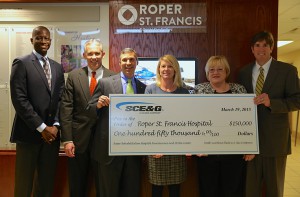
Pictured left to right: Cedric Green, general manager of southern electric operations, SCE&G; Bill Turner, vice president of electric operations, SCE&G; Danny Kassis, vice president of customer relations and renewables, SCE&G; Ashley Wieters Redmond, executive director, Roper St. Francis Foundation; Cathy Therrell, director, Roper Rehabilitation Hospital; and Matthew Severance, CEO, Roper Hospital.
Meanwhile on April 7, SCE&G donated $150,000 to Roper St. Francis Hospital for the Roper Rehabilitation Hospital Neuroscience and Stroke Center. When complete, the expansion of the facility will include a rehabilitation gym, private rehabilitation room, family lounge, conference room, unweighted mobility track, activities of daily living kitchen and 14 inpatient rooms. Through the gift, the hospital will name the SCE&G Neuro-Technology Workstation.
“The expansion of the Roper Rehabilitation Hospital is critical for this community,” said Roper Hospital CEO Matthew Severance. “We frequently have to turn away patients that need our care because we don’t have beds to treat them. This expansion would help us bridge that much-needed healthcare gap.”
In other recent news:
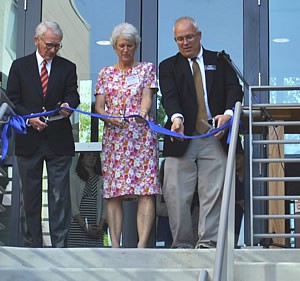 Ribbon cutting. Hats off to the folks at Mason Preparatory School downtown for its new lower school building, which was dedicated April 8. At right, a blue ribbon is being cut by (l-r), Charleston Mayor Joe Riley, Mason Prep board chair Penny Wilson and Head of School Erik Kreutner. Photo provided.
Ribbon cutting. Hats off to the folks at Mason Preparatory School downtown for its new lower school building, which was dedicated April 8. At right, a blue ribbon is being cut by (l-r), Charleston Mayor Joe Riley, Mason Prep board chair Penny Wilson and Head of School Erik Kreutner. Photo provided.
Transit talks. The Berkeley-Charleston-Dorchester Council of Governments (BCDCOG) has planned three public meetings and a series of focus group “Transit Talks” to gather input for its “I-26ALT” study. “I-26ALT” is a 20-year plan to enhance regional mobility with transit along the I-26 Corridor between Summerville and Charleston.
Meetings start April 20 in Charleston (6 p.m., Charleston Progressive Academy, 382 Meeting St.) and continue April 21 (Bethany United Methodist Church, Summerville) and April 22 (Military Magnet School, North Charleston). Those unable to attend can participate in an online forum () or any of several business forums.
FEEDBACK
Rant. Rave. Tell us what you really think.
If you have an opinion on something we’ve offered or on a subject related to the Lowcountry, please send your letters of 150 words or less to: editor@charlestoncurrents.com.
- Our feedback policy.
CALENDAR
April 13+: Earth Day, Spring Jam, paddling
Literary libations: 6 p.m. to 9 p.m., April 14, Mellow Mushroom, 309 King Street, Charleston. Close your book for the night and make a toast to literacy with the Charleston Friends of the Library at a special literary libation fund-raiser and silent auction to support local libraries.
Earth Day MUSC: 11 a.m. to 2 p.m., April 15, MUSC Horseshoe, 171 Ashley Ave., Charleston. The 7th annual free education event will feature live music, green food choices and lots of information about composting, rainwater collection, saving energy, reducing waste and becoming more sustainable.
East Coast Paddlesports: April 17-19, James Island County Park. The 25th annual event is one of the nation’s premier showcases of canoeing, kayaking and stand-up paddleboarding. Full event schedule is online.
(NEW) Earth Day Festival: 11 a.m. to 4 p.m., April 18, Riverfront Park, North Charleston. Charleston County’s Environmental Management Department will hold this free event on the formal Naval Base to provide hands-on education opportunities and to highlight the county’s environmental programs. There will be live music, a birds of prey demonstration and lots more.
(NEW) Spring Jam: 11 a.m. to 8 p.m., April 18, The Grove at Patriots Point, 40 Patriots Point Road, Mount Pleasant. The third annual event will feature musical performances by: Leftover Salmon, Ed Roland & The Sweet Tea Project, Delta Spirit, Milo Greene, Lefty at the Washout, The Travelin’ Kine, The High Divers, and Sol Black, plus special performances by The Music Battery, The Missing Links, Glitterhoopz, and Holy City Cirque. Tickets are $25 in advance, $32 on April 18. More.
Food Truck Rodeo: Noon to 4 p.m., April 19, Freshfields Village, Johns Island. The second annual Sea Islands Food Truck Rodeo will feature nine food trucks, music and fun. Part of the sales, as well as money from a silent auction, will benefit Sea Islands children through the Kiawah Women’s Foundation’s program to fight hunger.
Out to Lunch: 11:30 a.m. to 1:30 p.m., April 24, Hampton Park, Charleston. The Charleston Parks Conservancy is holding an “Out to Lunch with the Conservancy” sponsored by The Bridge 105.5 to celebrate spring. Food and drinks will be available from several vendors. More.
Drood: April 24-May 10, Footlight Players Theatre, 20 Queen Street, Charleston. The Footlight Players will offer a musical version of “The Mystery of Edwin Drood,” Charles Dickens’ final novel, for a two-week run. The Charleston premiere of the musical performance is said to engage the audience in creating the ending, which is appropriate because Dickens had not finished the novel when he died in 1870. Tickets are $25-$35. More.
(NEW) Golf tournament: 11 a.m. April 28, Wild Dunes Resort. The Charleston RiverDogs offer the club’s 10th annual charity golf tournament featuring food, drink and fun, including its Zombie Land theme. Proceeds will benefit the Storm Eye Institute. $600 per foursome. More.
(NEW) La Belle Epoque: 7:30 p.m. to 10 p.m., May 7, Meeting Street in front of the Gibbes Museum of Art, Charleston. The museum’s street party this year ($150 per ticket for members; $175 for non-members) will transform Meeting Street into Paris of the early 1900s as top chefs serve French food and guests enjoy live music. More than two dozen top restaurants are participating. More.
Fashion Flashback: Through May 10, 2015, 360 Meeting St., Charleston. The Charleston Museum will offer a new fashion exhibition, “Fashion Flashback, 1920s-1960s: Five Decades of Style that Changed America” in its Historic Textiles Gallery. A light-hearted look at 50 years of fashion, viewers will enjoy exploring clothing styles from the swinging 1920s to the hip 1960s. Learn more here.
Natural history exhibit: Through Aug. 10, 2015. “From Land to Sea: 35 Million Years of Whale Evolution” will be featured in The Charleston Museum’s lobby gallery with displays of whale fossils from millions of years ago. There’s limited availability for an overview by Natural History Curator Matthew Gibson on opening night. Learn more.
Bird walks: 8:30 a.m. to noon, every Wednesday and Saturday. This is the time of year that a great variety of migrating birds fly through the Lowcountry so what better time to take part in one of the regular early morning bird walks at Caw Caw Interpretive Center in Ravenel. Pre-registration is suggested. Cost is $5. Walks also are conducted on James Island and Folly Beach. Learn more online.
If you have an event to list on our calendar, please send it to editor@charlestoncurrents.com for consideration. The calendar is updated weekly on Mondays.
REVIEW
Under the Dome
A novel by Stephen King
![]() If ever there was a book with a theme, this is it, and King wants you to know it: A person may be smart and reasonable, but a group of people are easily manipulated by fear and are in no way reasonable. The premise here is that a small town is suddenly cut off from the rest of the world by a formidable and invisible dome. The difference between this dome and that of The Simpson’s Movie is that no one knows the source of this one. The dome itself certainly creates some issues (people crashing into the dome not knowing it’s there, survivors being cut off from loved ones or providers, diminishing supplies, stagnant air and water, etc.), but it is the people inside the dome who are the source of many of their own biggest concerns (greedy and opportunistic politicians being chief amongst them). Although the novel may seem somewhat unwieldy at over 1,000 pages, the plot is quick-paced; the writing style is entertaining; and the text is broken up into small and easily-consumable chapters. Other than the concept and the names and backgrounds of some of the characters, the book and the TV show are considerably different, so don’t let interest in one of them dissuade you from the other.
If ever there was a book with a theme, this is it, and King wants you to know it: A person may be smart and reasonable, but a group of people are easily manipulated by fear and are in no way reasonable. The premise here is that a small town is suddenly cut off from the rest of the world by a formidable and invisible dome. The difference between this dome and that of The Simpson’s Movie is that no one knows the source of this one. The dome itself certainly creates some issues (people crashing into the dome not knowing it’s there, survivors being cut off from loved ones or providers, diminishing supplies, stagnant air and water, etc.), but it is the people inside the dome who are the source of many of their own biggest concerns (greedy and opportunistic politicians being chief amongst them). Although the novel may seem somewhat unwieldy at over 1,000 pages, the plot is quick-paced; the writing style is entertaining; and the text is broken up into small and easily-consumable chapters. Other than the concept and the names and backgrounds of some of the characters, the book and the TV show are considerably different, so don’t let interest in one of them dissuade you from the other.
– Darryl Woods, Main Library, Charleston, S.C.
 Find this and similar titles from Charleston County Public Library. This item available as a book. To learn more or place a hold, visit www.ccpl.org or call 843-805-6930.
Find this and similar titles from Charleston County Public Library. This item available as a book. To learn more or place a hold, visit www.ccpl.org or call 843-805-6930.
MYSTERY PHOTO
Close-up
Clue: There have been a couple of comments in the last couple of weeks that the mystery photos have been a bit easy. So this week, where’s this? No clue given but this one might be easy too. Third person to guess correctly wins a pair of RiverDogs’ tickets. Send your entry, name and hometown to: editor@charlestoncurrents.com.
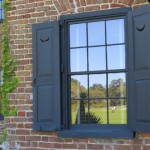 Last week, four people correctly identified Michael Kaynard’s photo of the reflection of the lawn at Middleton Place. Congratulations to Joe Mendelsohn, Charleston; Deborah Getter, Johns Island; and Christine Strampp and Chris Brooks, both of Mount Pleasant.
Last week, four people correctly identified Michael Kaynard’s photo of the reflection of the lawn at Middleton Place. Congratulations to Joe Mendelsohn, Charleston; Deborah Getter, Johns Island; and Christine Strampp and Chris Brooks, both of Mount Pleasant.
S.C. ENCYCLOPEDIA
Christopher Gadsden
Patriot and merchant Christopher Gadsden was born in Charleston on February 16, 1724, the son of Elizabeth and Thomas Gadsden, a collector of customs. Gadsden received a classical education in England before completing a four-year apprenticeship to a prominent Philadelphia factor. Between 1745 and 1747 he served as purser aboard the British man-of-war Aldborough. With money from his seafaring service and a large inheritance from his parents, who had both died by 1741, Gadsden launched one of the most successful mercantile careers in the province. By 1774 he owned four stores, several merchant vessels, two rice plantations (worked by more than ninety slaves), a residential district called Gadsdenboro in Charleston, and one of the largest wharfs in North America.
Possessing financial independence and a civic spirit, Gadsden pursued public office. In 1757 he began his nearly three decades of service in the Commons House of Assembly. He first revealed himself as a vocal defender of American rights during the Cherokee War by attacking the British colonel James Grant for taking command of local troops above provincial Colonel Thomas Middleton. Gadsden continued to defy British authority as a member of the assembly by opposing the governor and Royal Council in their attempt to infringe on the legislature’s right to raise troops, control money bills, and determine the election of its own members. Governor Thomas Boone marked Gadsden a troublemaker in 1762 and used a violation of a minor electoral practice to deny him his seat in the Commons House. The ensuing controversy between the governor and Gadsden swelled the merchant’s reputation as a defender of colonial rights and helped transform him into a zealous American patriot.
Gadsden continued to champion American home rule and to oppose Parliamentary supremacy at the Stamp Act Congress in New York in 1765. During the next decade, Gadsden joined with Charleston mechanics (Sons of Liberty) to lead the local “patriot party” against every perceived infringement of America’s rights by Parliament. Gadsden’s influence and dedication earned him election to the First Continental Congress, where his extremism manifested itself in proposals for Congress to reject all Parliamentary legislation passed since 1763, to attack the British fleet in American waters, and to instruct each colony to prepare for war. Gadsden returned to South Carolina in February 1776 to serve as colonel of the First Regiment and as a member of the Provincial Congress, where he promoted independence and coauthored the South Carolina constitution of 1776. That summer he helped repulse the British navy’s attack on Charleston, conduct that earned him a position as brigadier general in the Continental Army. Two years later Gadsden helped secure the disestablishment of the Anglican Church and popular election of senators in the state’s 1778 constitution. But the conservative faction dominating the assembly managed to dampen the firebrand’s influence in the new government by electing Gadsden to the impotent position of vice president (as the office of lieutenant governor was then known).
While Gadsden’s zealous and suspicious personality was ideal for organizing American resistance, it was counterproductive in the post-1776 political structure. In 1777 he impulsively resigned his commission as brigadier general over a petty dispute with General Robert Howe. The following year Gadsden violently upset the masses by favoring leniency toward local Tories. And while serving as lieutenant governor in 1780, Gadsden’s irrational temperament cost the United States more than two thousand Continental troops when Charleston fell to the British. Following a ten-month imprisonment in St. Augustine, Gadsden returned to South Carolina to rebuild his many business interests, which suffered considerably during the war. He returned to public service briefly in 1788 to vote for ratification of the United States Constitution and again in 1790 to serve in the state’s constitutional convention.
Gadsden married three times. On July 28, 1746, he married Jane Godfrey. The couple had two children. He married Mary Hasell on December 29, 1755. His second marriage produced four children. Following Mary’s death in 1768, Gadsden married Ann Wragg on April 14, 1776. They had no children. Gadsden died on August 28, 1805, from head injuries suffered in a fall near his home in Charleston. He was buried in St. Philip’s Churchyard.
– Excerpted from the entry by Keith Krawczynski. To read more about this or 2,000 other entries about South Carolina, check out The South Carolina Encyclopedia by USC Press. (Information used by permission.)
OUR UNDERWRITERS
Charleston Currents is an underwriter-supported weekly online journal of good news about the Charleston area and Lowcountry of South Carolina.
To learn more about how your organization or business can benefit, click here to contact us. Or give us a holler on the phone at: 843.670.3996.
SUBSCRIBE FOR FREE
Subscriptions to Charleston Currents are free.
- Click here to subscribe.
- Unsubscribe. We don’t want to lose you as a reader of Charleston Currents, but if you must depart, please click here.


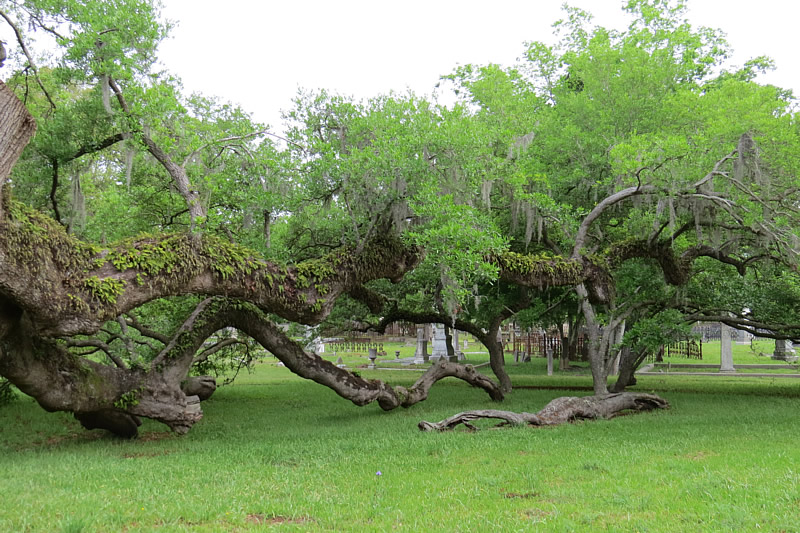
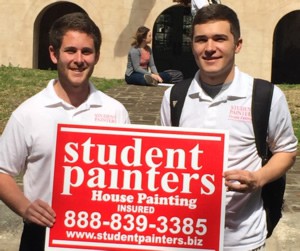

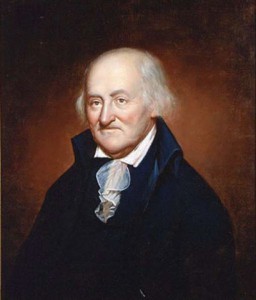

 We Can Do Better, South Carolina!
We Can Do Better, South Carolina!
























